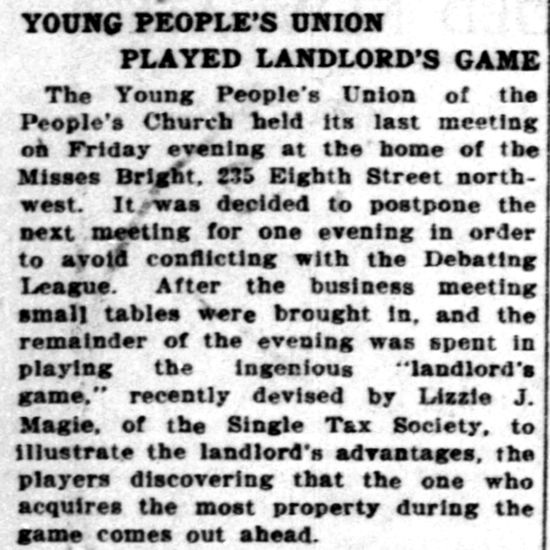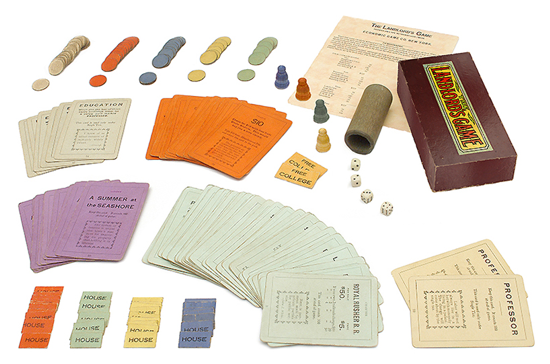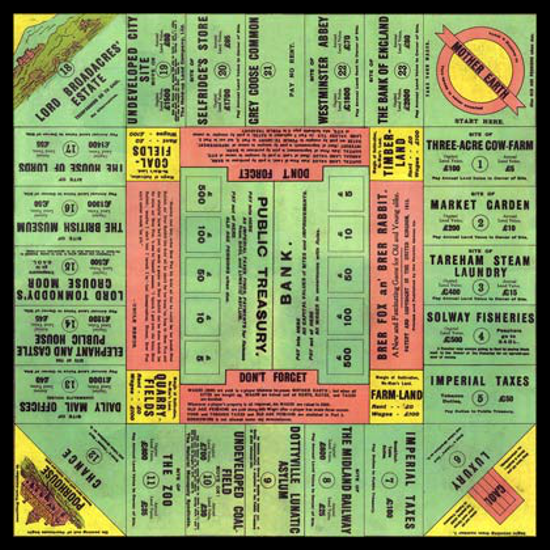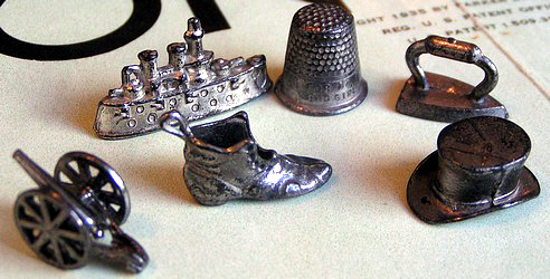 |
| Monopoly logo 1935 |
Name: "Monopoly" (1935)
Category: Games
Subcategory: Board games
Inventor: Elizabeth Magie
First producer: Economic Game Company (founded in 1906 New York by Elizabeth Magie and other fellow Georgists)
Invented in: 1903 - Arden, New Castle County, Delaware, USA
Production start: 1906 as "The Landlord's Game" - 1935 as "Monopoly" - USA
Features: The Landlord's Game is a realty and taxation game, which is considered to be the direct inspiration for the board game Monopoly. The set had rules for two different games, anti-monopolist and a monopolist. The anti-monopolist rules reward all during wealth creation while the monopolist rules had the goal of forming monopolies and forcing opponents out of the game. A win in the anti-monopolist, or Single Tax version and later called by Magie as "Prosperity Game", was when the player having the lowest monetary amount has double his original stake. The board featured a track around the outside edge of the board split into blocks representing properties and had their purchase price, and their rental value listed in the block. New York City’s Broadway, Fifth Avenue, and Wall Street were the top properties in price and rent. The published game included Chance cards with quotes attributed to Thomas Jefferson, John Ruskin and Andrew Carnegie. From the 1904 patented version to the published 1906 version, the property names were changed and the rule for increased rent for multiple railroad owned.
Interesting facts: In 1902 to 1903, Elizabeth Magie designed The Landlord's Game and play tested it in Arden, Delaware. The game was created to be a "practical demonstration of the present system of land grabbing with all its usual outcomes and consequences". She based the game on the economic principles of Georgism, a system proposed by Henry George, with the object of demonstrating how rents enrich property owners and impoverish tenants. In 1904, a patent on the game was granted; in 1906 Magie and other fellow Georgists formed a company, Economic Game Company, in New York to publish the game. In the United Kingdom it was first published in 1913 by the Newbie Game Company, formed by a Liberal Committee from the village of Newbie in Dumfries, under the title Brer Fox an' Brer Rabbit. On September 23, 1924, a second patent was issued to Magie for The Landlord's Game. In 1932, Adgame Company (Inc.) published The Landlord's Game and Prosperity under this patent, which included a new set of rules. Magie held the patent until 1935: in that year Charles Darrow, a domestic heater salesman, sold his version of the game to Parker Brothers Inc. under the name "Monopoly", and Magie sold her patent to the company. Monopoly was first marketed in a Standard Edition, with a small black box and separate board, and in a larger Deluxe Edition, with a box large enough to hold the board. Parker Brothers sets were the first to include metal tokens for playing pieces. In 1991 Parker Brothers was acquired by Hasbro.
Property: Hasbro, Inc.
Producer website: http://www.hasbro.com
 |
| The Landlord's Game, handmade board (1903) |
 |
| The Landlord's Game, figure from the first Patent granted to Elizabeth Magie (Jan. 5, 1904, filed Mar. 23, 1903) |
 |
| The Landlord's Game in a 1903 newspaper article (The Washington times, Washington D.C., February 14). «YOUNG PEOPLE'S UNION PLAYED LANDLORD'S GAME - The Young People's Union of the People's Church held its last meeting on Friday evening at the home of the Misses Bright, 235 Eighth Street north-west. (...) After the business meeting small tables were brought in, and the remainder of the evening was spent in playing the ingenious "landlord's game", recently devised by Lizzie J. Magie, of the Single Tax Society, to illustrate the landlord's advantages, the players discovering that the one who acquires the most property during the game comes out ahead». |
 |
 |
 |
| The Landlord's Game, replica based on the Economic Game Co. original (1906) |
 |
 |
| Brer Fox an' Brer Rabbit, UK variant of The Landlord's Game (Newbie Game Company, 1913) |
 |
| The Landlord's Game, figure from the second Patent granted to Elizabeth Magie (Sept. 23, 1924, filed Apr. 28, 1923) |
 |
| The Landlord's Game and Prosperity (Adgame Company Inc., 1932) |
 |
| Monopoly, figure from the Patent granted to Charles Darrow (Dec. 31, 1935, filed Aug. 31) |
 |
 |
 |
 |
 |
 |
| Monopoly, first standard edition (Parker Brothers Inc., 1935) |
 |
| Monopoly newspaper advertisement (Evening star, Washington, D.C., December 5, 1935) |
 |
| Monopoly advertisements (Parker Brothers Inc. - Left: Newsweek, November 9, 1935 - Right: Liberty, November 28, 1936) |
 |
| Elizabeth "Lizzie" J. Phillips née Magie (Macomb, 1866 - Arlington, 1948), the American game designer who invented The Landlord's Game, precursor to Monopoly |
 |
 |
| Hasbro celebrate the 80th anniversary of Monopoly (1935-2015) with a special edition which included tokens from the 1930s all the way to the 2000s |



